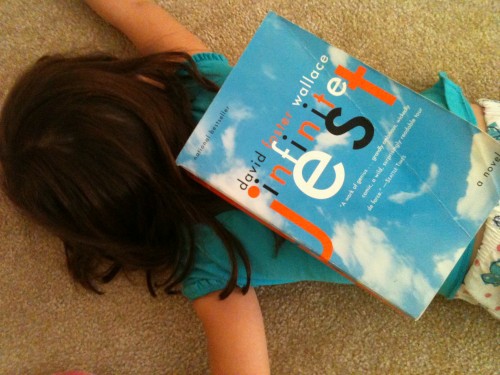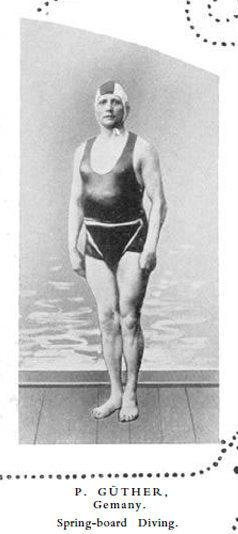Interview: Reader Who Recently Finished Infinite Jest
1. So how long did it take you to read the book?
I set a starting date at May 1 and then actually began a week before so I would have a buffer. I finished around August 1. So a little over 3 months.
2. Did you ever read the book in public places or leave the book out purposefully when visitors were over?
Ha Ha. I certainly read it in public places but I wouldn’t say I purposefully left it out. It was out tho and people would see it. I also mentioned it a lot in conversation. I did this less to brag about the endeavor and more to make sure I backed up my talk about reading it. I had tried reading 2666 by Bolano and never could get past book 5, I think book 5…Whichever one deals with all the deaths in Mexico. I hate that, not finishing a book. And I tend to have ADD and while reading a book will sometimes pick up other easier reading books, articles, chick mags, periodicals…For whatever reason I stayed focused on this book. I didn’t so much as pick up another book while reading it.
3. How did you deal with the footnotes, I mean logistically? I know some people like to use two bookmarks.
Oh yea, two book marks. I almost never use book marks and actually, it was more one book mark: just for the end notes. I did the dog ear for most of the main section.
4. Have you read other DFW? How did this book compare?
I have read a bunch of his nonfiction, which I love. I had tried reading his short stories about 5 years ago and could not make it through them. I am currently on a DFW binge though so I plan on picking all that stuff up and rereading it. I love his nonfiction a lot, but this book…it had such a depth to it that you obviously are not going to get reading his nonfiction. You can feel the work put into it, and the way it all adds up. I remember reading somewhere to “trust” DFW while reading this book. Just know at some point it’s going to click; and it did.
5. Did you ever read the book while on drugs or alcohol?
I hope you don’t quote my name so my mom sees that I do drugs and alcohol…but yes.
Understories
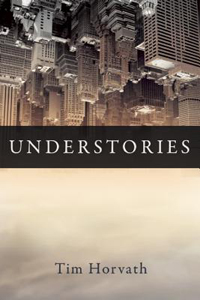 Understories
Understories
by Tim Horvath
Belleveue Literary Press, May 2012
192 pages / $14.95 Buy from Amazon
Understories rises and falls in the geography of an infinitely complex urban landscape. The book maps a city made up of cities. Narratives made of indirect, minor narratives; stories within stories. The larger tales—Circulation, Runaroundandscreamalot!, The City in the Light of Moths, and The Understory, rise like skyscrapers in that expanse. In between which are a half-dozen case studies on “Urban Planning” that examine topographies where the only buildings are played on film projectors and entire economies and social structures are derived entirely from restaurants. Those crevasses are populated further still by shorts and one-offs that are the equivalent of strolling upon a brilliance of a hidden spot that had previously gone unnoticed:
Horvath is a master of the small who exercises a very precise and peculiar brand of metaphysics. Each of these stories has unique moral and ethical dimensions that are penned in by the fantastic and the absurd. If you look closely, the larger narratives readers are used to—dramatic juxtaposition, struggle for meaning, moral dilemma, justice, life and death—get their fair treatment, but they are compromised by an elusive force. Each story contains within its dominant logic an under-nature running concurrently against it. It is a dialectic that at its very most implicates the mutual manifestations of subject and object which create a world just ahead of us able to be perceived and at its very least does well to reinvigorate some of the stale and deadened devices of storytelling.
August 6th, 2012 / 12:00 pm
9 straying summer tans
9. Laura Goldstein interview—lots about chapbooks here. Personally, I used to believe chapbooks were some form of stepping stone and it often works that way: lit mag/chapbook/book-book, etc., but now I am seeing more authors scatter in chapbooks throughout their writing lives…almost in the way flash fiction might break up a longer story collection. Anyway, Laura has some thoughts on said subject.
2. Got a hybrid, a novella, a bookie-wookie? Mud Luscious Press is open for submissions (Note: They have a reading fee.)
3. Not a lot of gender questions but some—my favorite moment was at Reed College, which is super liberal and very academic and a little pressured because of that. Great place, but a little pressured. I read a story called “Debbieland” about junior high school girls beating up a girl and after, someone asked why I wrote about such broken women and girls. And as a woman, didn’t I feel a responsibility to write strong women? I loved it as a question because it sets me up so beautifully to contradict that assumption. A perfect pitch to an eager bat. Because who wants to write strong all the time? Or read strong? Who is strong all the time
4. Wells Tower with a Mitt Romney (sort of—there’s other interesting tidbits, in the legacy of riding-on-the-bus journalism) profile:
5. The jury’s still out on whether Modernism exists, or whether it’s just a way of being snobbish about people like Orwell, who tends not to make the cut.
8. Elizabeth Bachner mashes us some Decadent sick/goodness. Beautiful writing.
Odds are I’m alive, but right now I don’t know whether I’m wrapped in animal or riding one. Either way I don’t know which kind of animal it is, or whether I can hold on, and if I don’t hold on will it still keep running? Maybe I’m not a monument to anything.
Literature, Materialism, and the Present Conjuncture: an Interview with David Winters
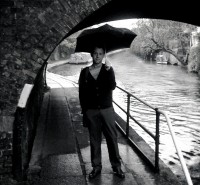 Literary critic David Winters, co-editor of 3:AM Magazine, has steadily developed a style and practice of review that can only be called materialist. Rather than “evaluate” a book, Winters qualifies its relationship to the broken and stultifying world from which it originates–not as an outright transcendence of that world, but as a moment, an effect, of its awful machinery, the gore and rancor of a history that has in many ways forgotten to bear a future. The book as such does not seek to solve the problems of the anima mundi but instead to put them on stage and in motion. So the work of literature, David argues, would not be the archangel of the everyday, but would try to give shape to its devastation, to the series of social splits and divisions whose conjunction make the novel possible, if not, David suggests, also threaten it with obsolescence. By focusing on this element of the book–its immortality and undead texture, its position as both a social given and a reflection of such givens–David has aligned materialist aims with a new form of criticism: a reading of the work as a weapon and not simply a code, and moreover, a weapon that can be trained on both itself and the present in which it is embedded. The following is an extended interview with him. Enjoy.
Literary critic David Winters, co-editor of 3:AM Magazine, has steadily developed a style and practice of review that can only be called materialist. Rather than “evaluate” a book, Winters qualifies its relationship to the broken and stultifying world from which it originates–not as an outright transcendence of that world, but as a moment, an effect, of its awful machinery, the gore and rancor of a history that has in many ways forgotten to bear a future. The book as such does not seek to solve the problems of the anima mundi but instead to put them on stage and in motion. So the work of literature, David argues, would not be the archangel of the everyday, but would try to give shape to its devastation, to the series of social splits and divisions whose conjunction make the novel possible, if not, David suggests, also threaten it with obsolescence. By focusing on this element of the book–its immortality and undead texture, its position as both a social given and a reflection of such givens–David has aligned materialist aims with a new form of criticism: a reading of the work as a weapon and not simply a code, and moreover, a weapon that can be trained on both itself and the present in which it is embedded. The following is an extended interview with him. Enjoy.
*
Cover to Cover: The Coffin Factory

The Coffin Factory is a magazine. I mean: you will read it and say “that was a MAGAZINE” and also you can fold it in half and not damage it. They are having a contest. I read most of the third issue on a bus, the rest on a porch. I read the whole thing then carried it around in my book bag or backpack, wanting to write about the issue but not doing so and instead opening the issue to take notes and simply enjoying the contents again and then sometimes researching the authors therein. I have read every issue (all 3) of The Coffin Factory to date. READ MORE >
The Last Vispo Anthology: Visual Poetry 1998-2008 is coming soon from Fantagraphics Books. Preorder & read an excerpt here.
15 Books
a.k.a. “Playing catch up with the stacks [3]”. I did a version of this in March and also back in May of 2011.
Basically, there comes a point where I’m swamped by newly received reading materials.
Stacks on stacks on stacks, if you will. (Sorry, I live in the dirty south, the home of T-Pain, and so I hear that Young Chris song incessantly and always think “stacks” instead of “racks”.)
Since I love lists and since I’m always curious about what others are reading, I assume others might be interested in what I’m reading. So here, then, are fifteen things I’m currently in the midst of:
from da generous Shane Jones: I have a lot of author copies for Daniel Fights a Hurricane and I want to give a few away. I was thinking a contest at HTMLGIANT where people can win a copy by creating a new kind of weather in the comments section and say what its effects are. I’ll pick three “winners” and send the copies out this weekend.
Commuting: Have gone to Ithaca – Frank Quitely
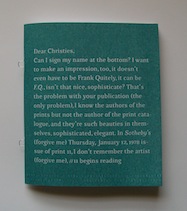 Commuting: Have gone to Ithaca – Frank Quitely
Commuting: Have gone to Ithaca – Frank Quitely
by Jared Joseph
TRNSFR / Varmint Armature Press, 2012
40 pages / $6 Buy from TRNSFR
This is a review of Commuting: Have gone to Ithaca – Frank Quitely by Jared Joseph, which is the third Chapbook from Alban Fischer and TRNSFR’s newish book arm Varmint Armature Press.
[Watch the Book Trailer here: Commuting: Have Gone to Ithaca. -Frank Quitely]
The title introduces the collection as a persona poem. Frank Quitely is the narrator. Frank Quitely is the clever inversion of “Quite Frankly”. The Frank of this work emerges in the title as a person making the journey to work. Frank is commuting to Mythical Ithaca. Everyone needs a commute, and Frank is no different. Frank Quitely is or wants to be the author of print catalogues for auction houses dealing in art like Sotheby’s and Christie’s. In the cover letter that opens the collection Frank asks Christie’s for some recognition as the one “who has wroughted”. This author character Frank is conflated and conflicted with the identity of the Jared Joseph, whose name intrudes upon the world of Frank in moments of Frankness or weakness. In Frank’s despair the world of the print catalogue collapses, and he wonders whether or not there are catalogues or prints inside them or if these are “just” poems or epigraphs to imagined pictures.
August 3rd, 2012 / 12:00 pm
Brooklyn based, small press Augury Books has extended its Editor’s Prize deadline until August 15th. DetailsHEEREREREREREREREREREeeeee

